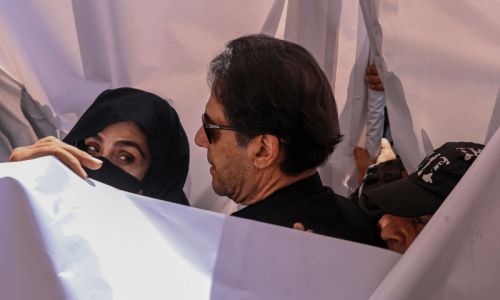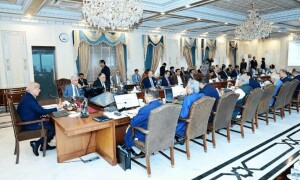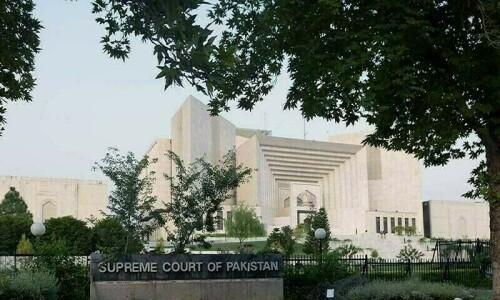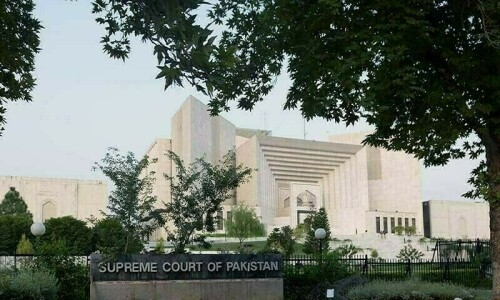WASHINGTON: The International Monetary Fund (IMF) has said that it’s working ‘hand-in-hand’ with Pakistan and its bilateral donors to ensure that Islamabad gets the financial support it needs to stabilise the economy.
Finance Minister Ishaq Dar told reporters in Islamabad on Friday that the UAE has confirmed financial support of $1 billion to Pakistan, removing a key obstacle to securing a much-awaited bailout tranche from the IMF. Last week, Saudi Arabia also told the IMF it would provide financing of $2 billion to Pakistan.
“Financing is required, and the financing needs are about what is currently in the programme, and this is where we are also hand-in-hand with the authorities and the bilateral supporters of Pakistan, working to ensure that the financing needs for the programme and beyond are assured,” Jihad Azour, who heads IMF’s Middle East and Central Asia Department, told reporters in Washington.
At a Thursday afternoon briefing in Washington, where the World Bank Group is holding its spring meetings, Mr Azour dispelled the impression that the Fund was dictating terms to Pakistan.
“When it comes to the future, … It’s a sovereign decision. The authorities of Pakistan will decide what are the reforms, what type of programmes they want, and what type of relationship they decide to have with the Fund,” he said. “The Fund stands ready, as it did in the past several decades, to assist Pakistan.”
Asked for an update on IMF-Pakistan talks for the resumption of the 2019 loan-package, Mr Azour said: “Pakistan is at a critical juncture today, and decisive actions are required to stabilise the economy.”
The policies that the Pakistani government adopted recently go in the right direction, he said, adding that the country needed to focus on two key points to stabilise the economy.
“On the one hand, (it needs) to maintain monetary stability by addressing the issue of high inflation that has exceeded 35 per cent, and it also (needs to) maintain a flexible exchange rate to protect its economy from external shocks,” he said.
“Discussions between the authorities and the IMF are ongoing, … to ensure that the measures that Pakistan needs to take, and are part of the review, are met,” he said. The IMF and Pakistan, he said, were also working together to ensure that Pakistan successfully completes the programme.
Responding to a question about the Fund’s long-term engagement with Pakistan, Mr Azour pointed out that the IMF “has been very supportive to Pakistan over the years with several programmes.” The latest programme, signed in 2019, needed “several modifications” to cater to the shocks that Pakistan went through, during and after the Covid pandemic.
“It’s very important for the Pakistani economy to address the imbalances and to maintain macroeconomic stability, and this is the stopping point: addressing inflation that is in double digits for the last three years, is a priority with or without the review,” the IMF official said. “Reducing constraints to trade and exports by having the right exchange rate policies is also important for the Pakistani economy and the Pakistani people, with or without an IMF programme.”
Similarly, “addressing the consequences of the flood by mobilising international assistance and channelling funds to ... the most affected is a priority for Pakistan, with or without a program,” he added. “Therefore, the priority for us is how to help Pakistan and the Pakistani economy to weather a period of economic tension (and) uncertainties.”
Mr Azour also indicated that the Fund was concerned about the current (“very active”) political situation in Pakistan.
“This is in the context of the programme that we have already agreed with the authorities on, and we have ensured that it’s based on a certain number of actions, based on a certain number of priorities. We have worked extensively with the authorities to make sure that those priorities are met,” he said.
Implementing these priorities, he said, will bring macroeconomic stability and enhance exports (as) “Pakistan is a country with huge talents and the capacity to grow faster.”
Published in Dawn, April 15th, 2023














































Dear visitor, the comments section is undergoing an overhaul and will return soon.